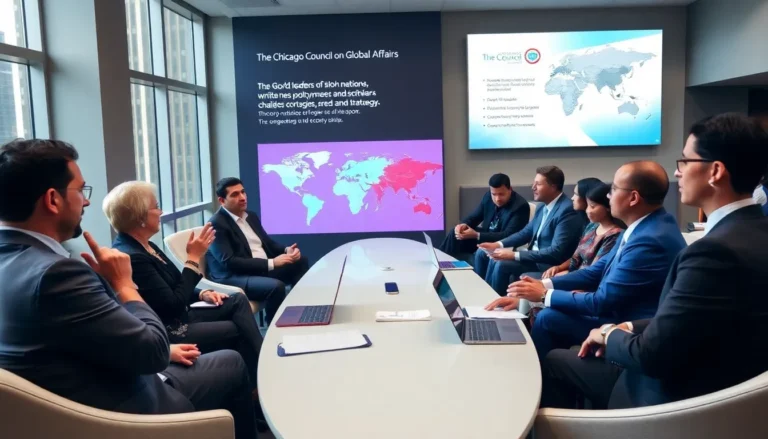Are you ready to change the world? Pursuing a Master’s in Global Affairs can kickstart a career where you tackle international issues, influence policy, and maybe even figure out how to get more countries to agree on pizza toppings. From navigating diplomacy to understanding global economics, these programs provide the knowledge and skills to make a real impact. Curious about what they entail? Let’s immerse.
Table of Contents
ToggleWhat Are Global Affairs Masters Programs?

Global Affairs Master’s programs are specialized educational courses aimed at understanding the complexities of international relations, global politics, and the socio-economic factors that influence our world. Designed for individuals who aim to work in international organizations, NGOs, or government diplomacy, these programs encompass a blend of theory and practical application. Often multidisciplinary, they cover topics such as globalization, conflict resolution, human rights, and international law. Students in these programs are encouraged to think critically about world events and develop strategies for addressing global challenges.
Also, many programs incorporate experiential learning opportunities, like internships or simulations, allowing students to apply their knowledge in real-world settings. This combination of rigorous academics and hands-on experience prepares graduates not just for a job, but for a meaningful career in affecting change on a global scale.
Key Features and Curriculum
When exploring Global Affairs Master’s programs, it’s essential to understand what students can expect from the curriculum. Most programs feature core courses such as:
- International Relations Theory: Students analyze different theories that explain the interactions between states and non-state actors.
- Global Economics: A jump into international trade systems and economic policies that drive global markets.
- Human Rights and Humanitarian Law: Examining the global frameworks that protect human rights.
- Conflict Resolution: Studying various methods and strategies to mediate and resolve international conflicts.
Plus to these core courses, students can often specialize in areas like environmental policy, security studies, or human rights advocacy. This flexibility allows individuals to tailor their education to match career aspirations. Besides, many programs promote a collaborative learning environment, encouraging students from diverse backgrounds to engage in discussions and group projects.
Top Universities Offering Global Affairs Masters
Several prestigious universities around the world offer robust Global Affairs Master’s programs. Here’s a quick look at some notable institutions:
- Columbia University (School of International and Public Affairs): Renowned for its focus on interdisciplinary studies, SIPA prepares students for impactful careers in government, private, and non-profit sectors.
- Tufts University (The Fletcher School): Known for its comprehensive curriculum, Fletcher offers a multitude of specializations, ensuring students find their niche in global affairs.
- Georgetown University (School of Foreign Service): With its strong ties to policy makers and global organizations, Georgetown provides students with invaluable networking opportunities and internships.
- Johns Hopkins University (School of Advanced International Studies): This institution emphasizes practical experience, offering students the chance to work on live projects facing global challenges.
Other respected names include the London School of Economics, Harvard University, and the University of California, San Diego. Each of these institutions brings a unique focus and benefits to the table, making thorough research essential for prospective students.
Career Opportunities with a Global Affairs Degree
Graduating with a degree in Global Affairs opens doors to various exciting career paths. Potential job roles include:
- Diplomat or Foreign Service Officer: Engaging with international relations directly by representing one’s country abroad.
- International Development Consultant: Working with organizations to enhance socio-economic conditions in developing countries.
- Policy Analyst: Conducting research and analysis to inform and influence public policy.
- NGO Manager: Overseeing projects and initiatives for non-profits focused on global issues.
- Human Rights Advocate: Fighting for justice and equality on behalf of the marginalized.
The skills gained during these programs, critical thinking, analytical reasoning, and effective communication, are highly valued across sectors. As global challenges become more complex, the demand for knowledgeable professionals in this field continues to rise.
Admissions Requirements and Application Process
Preparing to apply for a Master’s in Global Affairs? Here are the common admissions requirements:
- Bachelor’s Degree: Most programs require applicants to hold a bachelor’s degree from an accredited institution.
- GPA Requirements: A strong academic record is vital: many schools prefer a minimum GPA of 3.0.
- Letters of Recommendation: Generally, two to three professional or academic references are required to assess applicant qualifications.
- Statement of Purpose: A personal essay outlining goals, motivations, and career aspirations.
- Standardized Tests (GRE/GMAT): Some programs may require GRE or GMAT scores, while others waive this requirement based on the applicant’s academic performance or professional experience.
The application process usually consists of submitting online applications, alongside supplemental materials, within specific deadlines. It’s advisable to start early and reach out to admissions offices if questions arise.
Funding Options and Scholarships
Financing a Master’s degree can seem daunting, but various funding options exist. Many universities offer scholarships specifically for students pursuing Global Affairs degrees. These can be merit-based, need-based, or targeted at specific demographics, such as underrepresented groups in academia.
Also, consider applying for:
- Federal Student Aid: U.S. citizens can apply for financial aid through the FAFSA, which opens up options for federal loans and grants.
- Private Scholarships: Numerous organizations provide financial assistance for students in international relations and global studies.
- Assistantships: Graduate assistantships may offer opportunities in research or teaching, providing both experience and financial support.
Being proactive and researching potential funding sources early can significantly offset tuition costs and make pursuing a degree more financially feasible.








